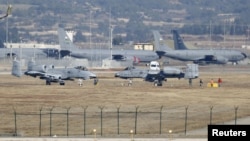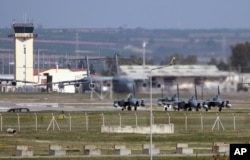With the capture of a strategic airfield in northern Syria this week from Islamic State, U.S.-backed forces and the American military have access to five air installations in the region, a network that can prove decisive in the fight against Islamic State, according to U.S. officials and analysts.
Two U.S. officials told VOA that American engineers and crews were working on repairing and restoring the airfield near Tabqa dam that was taken by the U.S.-backed Syrian Democratic Forces on Sunday.
U.S. General Carlton Everhart, commander of the Air Force's Air Mobility Command, told VOA that his men had airlifted SDF forces behind IS lines to allow them to launch the attack that captured the airfield.
Everhart would not confirm or deny whether his men were repairing the Tabqa airfield, because of operational security, but said his men would be able to “do so at a moment's notice.”
In 2014, IS fighters gained control of the air base from Syrian forces, killing at least 160 soldiers in the battle. It was formerly a Syrian government maintenance and attack base for Syrian air force MiG fighters purchased from Russia.
SDF commanders told VOA that the airfield was in tatters when it was captured, and that Islamic State fighters had destroyed much of the infrastructure. With repairs, though, the airfield could be used for flying in supplies, military hardware and troops to help SDF rout IS from its nearby de facto capital, Raqqa, Kurdish officials say.
The capture of Tabqa airfield comes as the U.S.-led coalition has been quietly increasing its aerial capability in northern Syria to include more landing areas and bases for taking the fight to IS.
Kobani to play role
U.S. military officials and SDF commanders told VOA on Friday that an airbase in Kobani will be the headquarters for U.S.-led coalition operations to retake Raqqa.
The Kobani base includes an airfield that was built from scratch by U.S. forces, they said. The base has been “up and running for a while,” one U.S. military official said, but is “still a work in progress.”
Speaking on condition of anonymity, the U.S. military official said the airbase about 110 kilometers north of Raqqa would be used in the same way as Qayyarah Airfield West in Iraq is being used for operations to retake Mosul.
Last week, U.S. Major General Jay Silveria said that the installations in Iraq and Syria were “key for setting a posture for the fight to continue” against Islamic State.
Silveria, the deputy commander of U.S. Air Forces Central Command, told reporters that Air Force engineers had restored a Syrian airfield so it is capable of receiving regular shipments of ammunition and supplies. In March alone, Silveria said, the airfield was used for at least 50 landings by C-17s and more than 100 landings by C-130 military cargo planes.
The Kobani airfield “is used more due to its size and because it is better equipped,” SDF commander Nasser Haj Mansour told VOA.
Kobani and the newly seized airfield in Tabqa increase the capability of the U.S.-led coalition to strike from the air and resupply troops on the ground.
Those bases add to three others already controlled by U.S. allies in the region: Syrian Kurds built an airbase last year on farmland known as Abu Hajar airport in the Rmelan area and nearly doubled the length of the runaway to initially allow for delivery of cargo. Two other airfields in the region, one formerly used for agricultural purposes and the other a former Syrian military base, have also been expanded by Kurdish forces.
Alternatives to Turkey's Incirlik
Since the rise of Islamic State, the U.S.-led coalition has used Incirlik Air Base in Turkey as the main staging area for air attacks against IS in Syria and in northern Iraq. The base is also used to support U.S.-based forces in both countries.
But relations between the U.S. and Turkey have become increasingly frayed over American support for Kurdish forces in the Syrian civil war and Turkish demands for the extradition from the U.S. of Islamic cleric Fethullah Gulen, whom the Turkish leadership blames for July's failed coup in Turkey.
Ankara opposes Washington's support for the Syrian Kurdish forces fighting IS. Ankara contends the SDF's Syrian Kurdish militia, known as the YPG, is a terrorist group affiliated with the outlawed PKK — the Kurdistan Workers' Party, which has been battling the Turkish state for many years.
Although U.S. Secretary of State Rex Tillerson hailed Turkey as a trusted ally in the fight against IS during his visit to Ankara this week, Turkish officials have continued to issue veiled threats of reprisals for the support Washington has given to Syrian Kurdish fighters. Turkey could, for example, place restrictions on flights by U.S. and coalition aircraft from the NATO base at Incirlik.
However, analysts note that the U.S.-led coalition's efforts to upgrade air facilities in northern Syria could eventually reduce its reliance on the Incirlik base.
“Any alternative to Incirlik reduces Turkish bargaining power and leverage,” said Michael Rubin, a former Pentagon official who is now an analyst with the American Enterprise Institute in Washington.
Gonul Tol, the Middle East Institute's program director for Turkey, told VOA that bases like Tabqa are not yet viable alternatives to the scope of Incirlik.
"Incirlik is a NATO base, al-Tabqa is not," he said. "Al-Tabqa does not measure up to NATO military standards. I don't think it can be an alternative to Incirlik. Air bases in Eastern Europe may be an alternative, but not al-Tabqa in Syria."
U.S. commander Everhart said the fight against IS has no bounds, and that his forces will take the fight to IS no matter where they are based in the region, “whether it is in Incirlik or whether it is at al-Udeid [in Qatar] or whether it is at another place.”
VOA's Kasim Cindemir contributed to this report.

